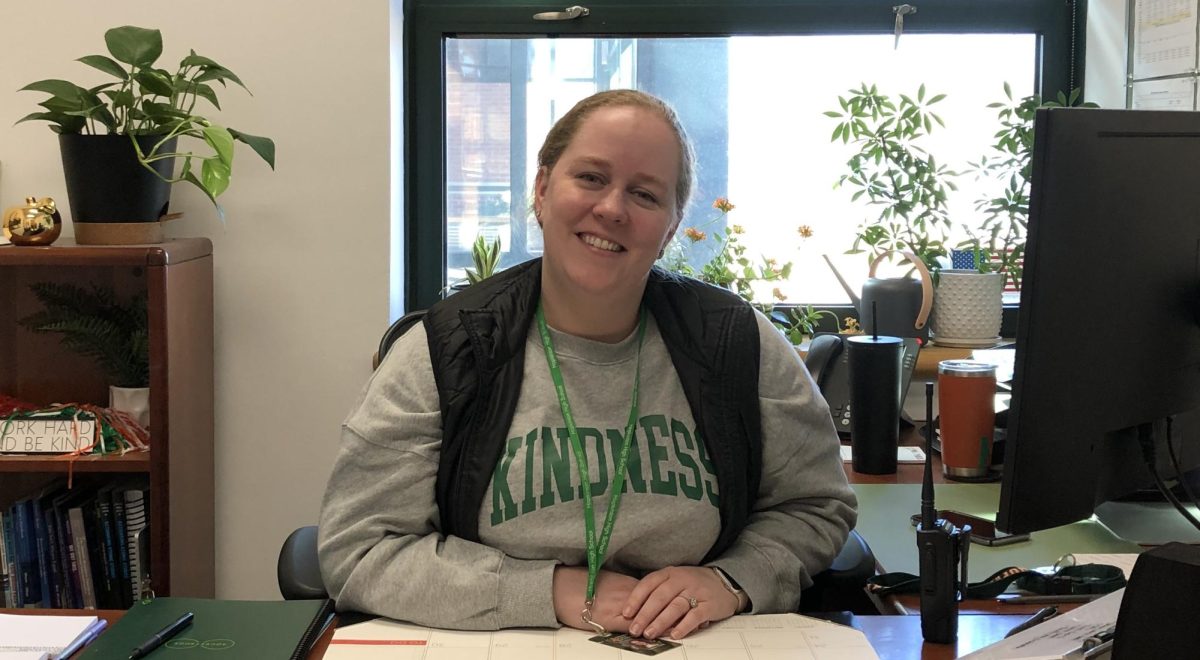
By Jamie Horrigan
Hopkinton High School Principal Alyson Geary along with Director of Secondary Education Robert Berlo and fourteen curriculum team leaders gathered at the High School Athletic Center to discuss several drastic curriculum changes with the parents of the incoming ninth grade students this past March. The most significant change is that the majority of the incoming ninth grade students would be retaking Algebra I.
Robert Berlo explained that Massachusetts began revising the mathematics frameworks in 2008. However, in 2009, an effort coordinated by the National Governors Association Center for Best Practices and the Council of Chief State School Officers gained resulted in the production of the Common Core State Standards for English Language Arts and Mathematics. Massachusetts adopted the Common Core in the summer of 2011. The result has most significantly impacted the current mathematics curriculum.
Throughout Massachusetts most ninth grade students take Algebra I as freshmen, but at Hopkinton High School past freshmen have taken Geometry. This fall the majority will retake Algebra I; however, students who are currently taking eighth grade Advanced Math and are doing well in the class will take accelerated geometry.
“Now, I’m sure a lot of you are saying wait a minute, my son or daughter is taking Algebra I now. I want you to think of Algebra I as a title for a chunk of curriculum. That chunk of curriculum has changed drastically. What is in Algebra I right now is not what’s in this new Common Core. It’s very different,” explained Berlo. “Basically, what has happened is in order to make students both college and career ready. The development of the Common Core said that students in high school need to leave high school and move right into the next level of math, but what was happening in many cases was that students were repeating their math in their first year in college.”
However, many majors, such as engineering and many pre-medical programs, require individuals to take Calculus I as a college freshman, which is typically the class that seniors end up taking.
“Depending on the level of calculus a senior takes, it may or may not cover the requirements for a college level class. Advanced Placement Calculus is one of the hardest classes I have ever taken, and retaking Calculus I as a freshman in college would be beneficial for most students,†noted senior Carolyn O’Leary.
Traditionally, students have taken geometry as freshmen, followed by Algebra II as sophomores, pre-calculus as juniors, and either calculus or statistics as seniors. This new curriculum plan would have students taking Algebra I as freshmen, Geometry as sophomores, Algebra II as juniors, and pre-calculus as seniors, unless students doubled up on math one year.
“Essentially what we are looking at is five years of math to get to calculus, with only four years available in the high school. This is in the best interest of students, and it is in the best interest of students here at Hopkinton,†said Berlo.
Senior Jaime Hinkel believes that due to the rigor of other classes and students wanting to explore the arts and music, the likelihood that students would double up in math is pretty low.
“Students would probably need skills from a lower level math class to succeed in a higher level, so doubling up seems quite challenging. I also wonder if not reaching calculus would have an impact on college admission and scholarships,†mentioned Hinkel
“One of the things that we have here in Hopkinton that we are very proud of is that we have a group of students each year that we’re allowed to say they are of this caliber; we can say they are in Advanced Math. The state is saying you can’t have that, but you can have something called ‘acceleration’ in Math.  So in the middle school next year, there will not be any more advanced math. Instead, according to the state and federal guidelines in grades 7 and 8, there will be an accelerated math course where curriculum is actually compacted, with students having three years of math squeezed into two years.”
Berlo added. “In the high school, we will have a similar program, and once again, it will be called accelerated math. What happens here is three years of math are compacted into two years, and there is no more pre-calculus. So students who get into this program take accelerated Algebra I, accelerated geometry, and Accelerated Algebra I, and then they would be in line for calculus, either AP or some other flavor.â€
Carla Crisafulli, the Hopkinton High School Mathematics Team Leader gave deeper descriptions about class levels to help the parents decide which level of math would be best for their students.
“The definition of what Algebra I currently is, is a much lesser version of what it is going to be next year in high school. Next year at the high school, the majority of the incoming freshman will be taking Algebra I, but it will be covered at a much deeper level, and there is much more content. So it is really a much more challenging and rigorous course at all levels. Something new we have at the math department is three levels of math,” said Crisafulli.
She added, “Currently we have a certain group of students taking advanced math. They will continue along that path and take accelerated Geometry next year. They will have met all of the requirements for the new and old Algebra I standards to be able to start on that accelerated path in geometry.”
Crisafulli also noted that the parents should consult their child’s eighth grade math teacher if they are confused about what level their child should take.
For existing high schoolers, there is also the possibility of some students taking AP Calculus AB junior year and AP Calculus BC senior year. The only difference between the two classes is that Calculus BC covers two more chapters than AB Calculus, making it equal to a full year college course, while AB Calculus covers one college semester.
“I think calculus would be less challenging if it is taken as a two-year course,†said AP Calculus student Jaclyn Foisy.
Principal Alyson Geary noted that adjusting to these changes and high school in general will not only affect the students but also the parents.






